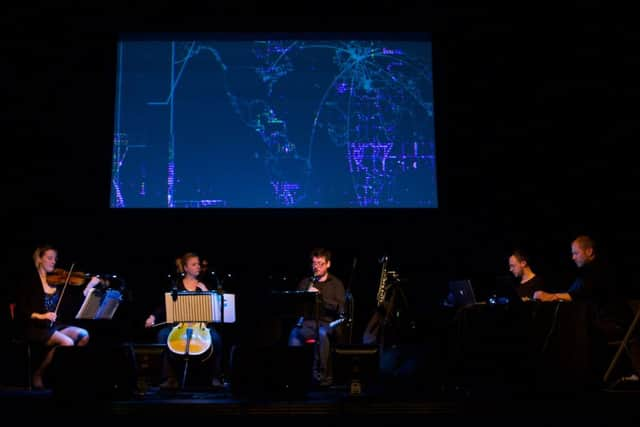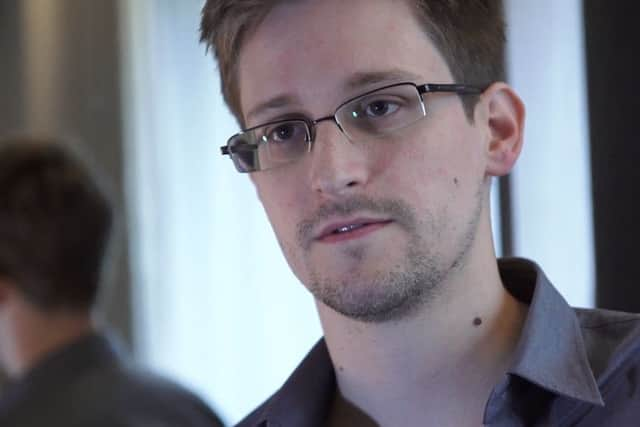How Edward Snowden inspired a musical vision of the future


Some might argue that the Edinburgh-based Collings is being pessimistic, bordering on paranoid, there. But the story of Edward Snowden, who blew the whistle on mass government surveillance of internet communications on both sides of the Atlantic and now claims an exiled refuge in Russia, speaks to some of the most pressing concerns of the modern age. What is the internet doing to us, it asks, who is in charge, and how benevolently do they exercise that power?
The death Collings speaks of isn’t only the imagined passing of Snowden. “It’s about the death of privacy too,” he says, “and the fact that now that we’re aware of this, can we go back again? I don’t know if that’s ever going to happen, I think in terms of surveillance we’re just going to have to live with how things are.
Advertisement
Hide Ad

“The death of the excitement of the internet, that’s something Snowden has talked about, as well – of the role that the internet had played in his life, in terms of suddenly being able to communicate with anyone around the world on a level playing field. There was a sense of innocence in that communication, that you could say what you wanted to anyone, and this piece is about the death of those ideals. And the sacrifice he’s made – he’ll probably never see America or his family again.”
Collings’s key collaborator on the project, which is presented here by Magnetic North, is Jules Rawlinson, an academic and designer of sound and visual installations. “It’s a love letter to Snowden,” says Rawlinson, “although perhaps ‘love letter’ isn’t quite the right phrase. It’s a 50-minute audio-visual exploration of the theme that everything we do at this point in the 21st century is monitored and snooped upon. Matt is fond of calling it a ‘digital opera’.”
That description isn’t entirely divorced from how the piece has been conceived, says Rawlinson. Composed for Collings’s (Rawlinson’s former student at Edinburgh College of Art) wash of electronic sound with the accompaniment of cello, violin and clarinet, it uses the voice not necessarily to create a singing effect, but to introduce Snowden and the sound of excerpted telephone conversations being woven into the piece. There’s also a visual element which helps create a full multi-media piece.
“It’s a contemporary composition,” says Rawlinson, “which fits within more popular forms of music, for example groups like Sigur Ros and dream-pop styles. It’s a true collaboration, it’s not just a case of tacking visuals on to an existing piece of music. It was Matt who first proposed it and I got caught up in the themes of these issues which affect us all.”
From the start point of having a clean slate, the pair worked to devise a means by which these themes could be made into something visual and audible. “How do we represent the fact that when you walk down Princes Street, you’re going to be caught on camera countless times?” says Rawlinson. “How do you move that from a local to a global perspective and think about that in terms of sound design? What does hacking look like? What does hacking sound like? What do servers sound like? We want people to understand the scale and the scope of just how much data is being collected.”
Advertisement
Hide Ad“It’s worldwide,” continues Collings. “This idea of trying to collect all global communications, all the time, a vast amount of information involving vast amounts of people stretching across the world. We’re trying to portray the scale of it, but also that it’s a very personal thing, because that mass still contains intimate information about each individual. So it’s trying to deal with those two extremes. In the piece, the electronics represent this huge force and each instrument is an individual person. We wanted to see if they can affect this mass of information, and if so, how.”
Collings has described his work as being influenced by alternative rock groups like My Bloody Valentine, but excerpts of A Requiem For Edward Snowden already heard contrast more with his admiration for contemporary classical composers like Steve Reich and David Lang. In representing the theme he’s used a very precise technical method built around his use of sidechain compression when producing his music.
Advertisement
Hide Ad“You know when you’re listening to the radio,” he asks, “and if music’s playing and the DJ starts talking, the music level drops so they don’t compete with one another? It’s applying this in a really extreme way to live performance, the idea being that an input from, say, an instrument will affect the volume of another sound. It’s representative of that thought again – can an individual in any way affect this massive thing that’s way beyond their control?”
In reacting to the subject, says Rawlinson, the pair had a very personal response. “We don’t really have different politics,” he says, “but I think Matt’s more engaged with the personal side of it, and there’s an anger and a frustration contained in that. The piece starts off being fairly reflective and becomes really quite chaotic. It’s a complex issue for all of us, though. I mean, Google knows far more about me than I will ever know about myself.”
Collings laughs, pointing out that the pair have been invited to speak at a privacy and security conference also happening in Edinburgh this month. “But that’s good, it continues the conversation,” he says. “We want people to keep talking about this issue, to keep engaging with it. It’s very common with the way news and media works for stories to drop off people’s radar very quickly, but this needs to be at the forefront of things to discuss, to be disturbed or worried about.
“It hasn’t gone away and it needs to be debated.”
• A Requiem for Edward Snowden is at Stockbridge Church, 8pm, tonight until 22 August